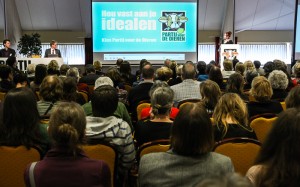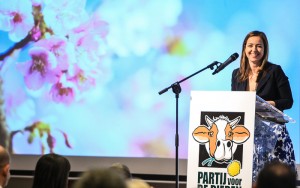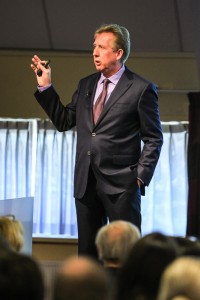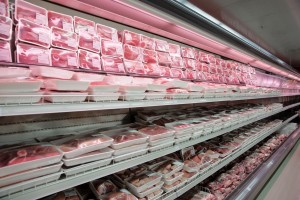Worldlog Settimana 16 – 2013
Domenica 7 Aprile abbiamo avuto nuovamente un congresso del partito a Doorn con un’affluenza enorme. C’era tra l’atro un fantastico discorso del professor Jan Rotmans. Lui ha citato Herman Verhagen: Non viviamo in un’epoca di cambiamento ma in un cambiamento di epoche. Una dichiarazione molto adatta!
Ho fatto delle interrogazioni parlamentari circa la presenza di animali domestici in alimenti e mangimi. Nel quotidiano olandese NRC la scorsa settima c’era un articolo che raccontava che in Spagna cani randagi, animali feriti in incidenti e animali domestici sono usati in prodotti che sono poi venduti come materia prima per mangimi. La possibilità esiste che questi mangimi sono stati forniti anche a imprese dei Paesi Bassi. Inoltre un’impresa olandese è sospettata di essere coinvolto in questa faccenda. Quest’azienda dovrebbe perdere la sua licenza immediatamente, a nostro avviso.
C’è un altro scandalo della carne di dimensioni senza precedenti. Non meno di 50 milioni di chili di carne sospetta sarebbe stata usata dal 2011 in pizze, conserve e piatti pronti! L’industria alimentare parla di centinaia di milioni di pasti nei quali è usata carne sospetta. L’Autorità per Alimenti e Prodotti Olandese (NVWA) dice di averlo scoperto solo adesso.
La causa di tutti questi scandali della carne sta nel fatto che l’industria alimentare è concentrata su carne al prezzo più basso possibile, che ci sono appena dei controlli perche lo stato lascia che il macellaio letteralmente certifica la sua stessa carne (autoregolamentazione) e che lo stesso stato ha tagliato fortemente nella vigilanza da parte della NVWA. E questo a spese di esseri umani e animali. La NVWA deve poter funzionare molto meglio per poter rintracciare questo tipo di pratiche fraudolente!
Giovedì scorso ho richiesto un dibattito e si svolgerà probabilmente la prossima settimana. Il Partito per gli Animali vuole che la NVWA pubblica subito l’elenco delle aziende alle quali è stato venduto la carne, in modo che i consumatori possono proteggersi da soli. Finora la rifiuta. La NVWA dice che non ci sono prove che la carne potrebbe essere un pericolo per la salute pubblica, ma allo stesso tempo dichiara di non sapere assolutamente da dove proviene la carne. Con una tale falsa rassicurazione la NVWA si rende completamente incredibile. Purtroppo non abbiamo avuto alcun sostengo nel parlamento da parte dei partiti tradizionali PvdA, VVD, D66 e CDA, per render pubblico l’elenco il più presto possibile. VVD e CDA comunque non avevano alcun bisogno di un dibattito, dichiaravano. Il sottosegretario agli affari economici adesso deve rispondere prima di martedì prossimo ala nostra richiesta.
Anche la Francia si sta riscaldando per il pensiero che dobbiamo cambiare da proteine animali a quelle vegetali. Bello! Più notizie dalla Francia: c’è stata una fantastica recensione nell’ Huffington Post Francese in occasione del lancio della presentazione del libro Meat the Truth, due settimana fa a Parigi.
Alla prossima settimana!
On Sunday, April 7 we had a heart-warming party conference in Doorn with a huge turnout. We enjoyed such things as a fantastic speech by professor Jan Rotmans in which he quoted Herman Verhagen: We do not live in an era of change but in a change of eras. A very catchy statement!
I asked parliamentary questions about pets being found in food and cattle feed. Last week, a Dutch newspaper called NRC contained an article that touched on how in Spain, unwanted dogs, wild animals that have been hit by cars, and pets are being processed into products that are sold as such things as raw material for animal feed. It’s very possible that this feed is being supplied to Dutch businesses. A Dutch business is also suspected of being involved. As far as we’re concerned, this business should immediately lose their licence.
And yet another meat scandal of unprecedented scale. At least 50 million kilograms of suspicious meat have been added to pizzas, cans, and ready-to-eat meals since 2011! The foodstuff industry says hundreds of millions of meals have had suspicious meat included. The Dutch Food and Consumer Product Safety Authority (NVWA) say they’ve only just found out about this.
All these meat scandals are down to the fact that the food industry focuses on making meat as cheap as possible. Very few checks are performed because the government itself gives the seal of approval – which is self-regulation – and they have made considerable cuts to the NVWA’s supervision these past few years. And it is both animals and humans that pay. The NVWA needs to be able to function on a much higher level in order to be able to detect these types of fraudulent practices!
Last Thursday, I asked for a debate, which will probably take place next week. The Party for the Animals wants the NVWA to immediately publish the list of businesses to which the meat was sold, so consumers can protect themselves. They have refused to do so up to this point. The NVWA says there are no indicators that the meat poses a threat to public health, but at the same time says they absolutely do not know where the meat comes from. The NVWA are doing themselves no favours with these false reassurances. Unfortunately, we in the Lower House have received no support from the traditional parties of the Dutch Labour Party (PvdA), the People’s Party for Freedom and Democracy (VVD), D66, and the Christian Democratic Alliance (CDA) for making the list public as quickly as possible. The VVD and the CDA said they had no need of a debate. The State Secretary of Economic Affairs must now react to our request before this Tuesday.
France is warming up to the idea that we need to switch from animal to vegetable proteins. Wonderful! More news from France: there was a great review in the French Huffington Post as a result of our Meat the Truth book presentation two weeks ago in Paris.
See you next week!



